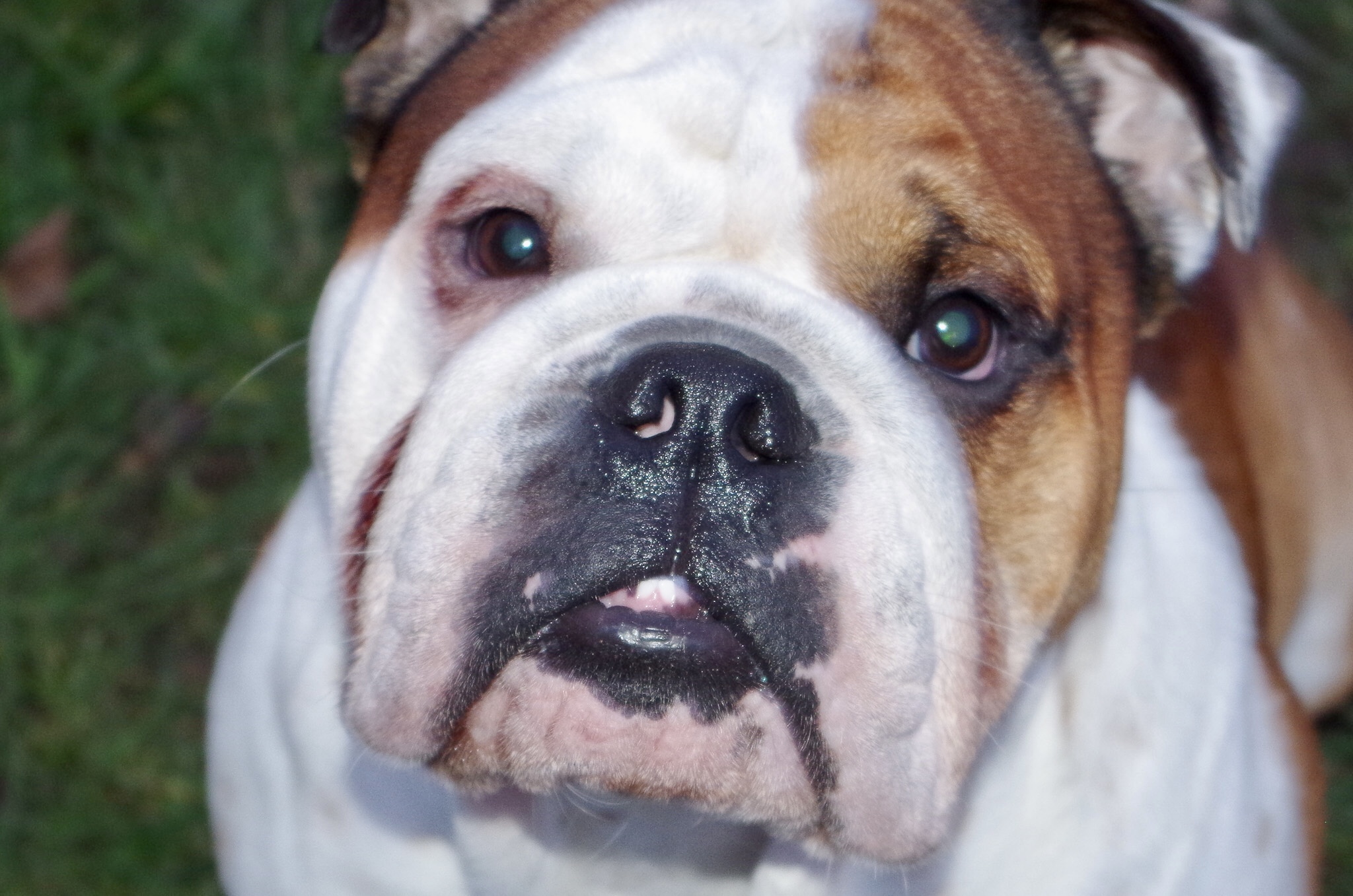Caring for a bulldog comes with a unique set of challenges, and among them, skin health often tops the list. One of the most common concerns for bully parents is bulldog eczema – a condition that can cause discomfort, itching, and inflammation in your beloved pet. Understanding the causes, symptoms, and effective management strategies is crucial to keeping your bulldog happy and healthy.
In this guide, we’ll dive into the essentials of bulldog eczema, providing practical tips and insights to help you address this issue head-on. Whether you’re a seasoned pet parent or new to bulldog parenthood, this guide has everything you need to support your furry friend’s well-being.
Can Bulldogs Get Eczema?
Yes, bulldogs can get eczema!
In fact, bulldog eczema, also known medically as canine atopic dermatitis, is the number one skin issue plaguing bulldogs in the UK and around the globe. Between increased allergies in the bulldog breed, multiple skin and fat folds, and general breed disposition, your poor bully is probably going to experience the itchy skin condition at least once.
The most common dog breeds to get eczema, according to UoN are:
- Labrador
- Hungarian vizsla
- Bichon frisé
- Boxer
- Shar Pei
- Rhodesian ridgeback
- Bulldogs, particularly French bulldogs
- Golden retriever
- Basset hound
- English springer spaniel
- Bull terrier
- West highland terrier
- Tibetan terrier
What Does Canine Eczema Look Like in Bulldogs?
Canine eczema or atopic dermatitis can look vastly different in different dogs, but there are usually underlying symptoms that are the same, such as scratching and excessive licking or grooming. The condition is a complex one, with several causes and secondary issues, such as infections, to think about.
Bulldogs with eczema will usually display multiple symptoms from the following:
- Frequent scratching
- Licking, chewing, and/or biting at paws/affected area.
- Discolouration from saliva staining
- Obvious red sores from scratching or over-licking
- Fresh or dried blood around affected areas
- Crusty, dry, and flaky skin
- Increased oil production in affected areas
- Thinning hair and/or hair loss
- Unpleasant/odd smell coming from affected areas
- Thick and toughened patches of skin
- Increased shedding
- Whining, crying, other physical pain-based vocal noises
- Not letting you touch the affected areas
- Getting snappy or irritable as a result of pain or discomfort
- Repeated sneezing, coughing, and/or runny eyes
Some dogs will have barely any symptoms at all, while others will have every single one. The severity and quantity of symptoms depends on the type of allergen, how long your bulldog has been exposed to it, and the severity of their allergy. The more severe the allergy, the more severe and intense the symptoms will be – much like human hay fever.
Alongside these doggy eczema symptoms, bulldogs can also develop secondary conditions or infections as a result of incorrect or no treatment. These include bacterial and yeast infections alongside long-term or permanent damage to the hair follicles or skin.
Why Do Bulldogs Get Eczema?
The University of Nottingham refers to canine atopic dermatitis as an “allergic skin condition,” and studies have shown that it affects ten percent of all dogs, regardless of breed. Bulldog eczema is not fully understood, nor are the exact causes or why it happens to some dogs and not others. Some breeds are believed to have a more dramatic immune system than others, causing more allergic reactions.
Male bulldogs suffer with skin conditions such as eczema more than females, according to research from the Royal Veterinary College London.
The inflammatory skin condition happens when something, such as dust or pollen, activates your dog’s immune system. The immune system then goes into overdrive, acting like a massive drama queen. It overreacts to the allergen, which is what causes the scratching, licking, and other common bulldog eczema symptoms.
So, what causes your bulldog’s immune system to overreact in such a way? The answer is… well, a bucket load of things. So many things. We could be here all day if I were to start listing them.
The most common causes of bulldog eczema, according to experts, include:
- Allergens in fragranced, ingredient-laden moisturisers and other products
- Foreign objects stuck in paws, fat and skin folds, etc.
- Dirt and grime buildup on skin and in folds
- Cleaning products around the home
- Perfume and home fragrance products
- Yeast and bacterial infections
- Pollen, grass, and other outdoor allergens
- Mites, lice, fleas, and ticks
- Allergies to food, such as chicken or wheat
- Mould spores
- Insects and insect bites or stings
How is Eczema in Bulldogs Diagnosed?
The first step to getting your bulldog diagnosed with eczema is to take a trip to the vet. They will examine your doggo, ask questions, compile a list of symptoms, look over the pup’s medical history, and perform localised testing. Usually, eczema is diagnosed when every other condition has been ruled out.
Allergy Testing
Vets can perform tests called allergy testing, which determines, exactly, which specific things your bulldog has an allergic reaction to. Most vets would recommend two tests, but you can opt for just one:
- Intradermal testing – IDT
- Serum allergy testing
In short, your pet’s skin is exposed to tiny amounts of different things, such as pollen, in liquid substances. If your bulldog’s skin reacts to the substance, they have an allergy. Reactions can range from very mild, where there is the smallest of reactions, to very severe, where the reaction is great – and can be potentially life threatening.
How Do You Treat Eczema in Bulldogs?
Before you start treating bulldog eczema you must first work out what has caused it. Your vet can help with this, but a little common sense goes a long way, too.
Frank the bulldog has a problem with one particular brand of cleaning product and home fragrance. Whenever we use them in the house, he starts scratching, excessively licking, whining, and not letting us touch certain areas, such as his paws.
As soon as we stop using that particular brand of cleaning and home fragrance products, Frank goes back to normal. He stops excessively licking and chewing his paws, stops scratching like a maniac, plays with his favourite toys again, and generally returns to being his mad bully self.
Alongside certain household products, Frank also has issues with chicken. Eating it causes the same allergic reaction symptoms as the aforementioned cleaning products – scratching, licking, whining, being snappy and irritable whenever we try to go near the affected area.
Removing the thing that causes the allergic reaction and, in turn, bulldog eczema, should reduce your doggo’s symptoms over time. It won’t get rid of the immediate symptoms, such as scratching, licking, and being irritable, but it will stop the symptoms from progressing.
At the same time, your bulldog’s immediate symptoms need addressing. There are several treatment options, but your vet will point you in the direction of the right one. Many of the treatments require a prescription or administration by a trained and licensed vet.
Treatment will depend on several different factors, including:
- Location of affected areas
- How widespread the problem is
- Whether there are secondary issues, such as infection
- If the problem is new or ongoing and not responding to previous treatment
- How long the treatment takes to have effect, if any
- Your preferences
Bulldog eczema treatments are usually layered up, and can include one or more of the following:
- Topical steroids
- Synthetic antibodies
- Anti-inflammatory medications
- Neural pathway blockers (to stop the brain processing the itch)
- Immunotherapy
- Antihistamines
- Dietary changes or restrictions
Your vet might also recommend visiting a specialist doggy dermatologist for particularly stubborn flareups or eczema that doesn’t respond to traditional veterinary treatments.
Bulldog Eczema FAQ
What supplements are good for bulldog eczema?
Veterinarians recommend a handful of natural, non-prescription supplements for bulldogs with eczema, including omega 3 fatty acids. It’s not recommended to give your doggo supplements without first consulting with a vet, though. You run the risk of your pup “overdosing” on a vitamin or mineral, which can be just as dangerous, if not more so, than a deficiency.
Can you prevent eczema in bulldogs?
To a certain extent, yes, you can take measures to reduce the chances of your bulldog suffering from skin conditions such as eczema. Sadly, it Is impossible to prevent it entirely. You can make an effort to use all-natural products on both your bulldog and around the home. What you can’t do, though, is stop your bulldog from ever coming into contact with mites, pollen, dust, or several other allergens that could cause the extreme immune system reaction.
Summary: Bulldog Eczema
So, let’s summarise everything we’ve talked about today.
Bulldog eczema, known medically as canine atopic dermatitis, is when the dog’s immune system overreacts to an allergen, such as pollen.
Once your pup has it, there’s a high chance that you’ll need to monitor and manage the situation for the rest of their life.
Symptoms can be managed with a range of treatments, two or more usually working in conjunction with each other. With the right treatment plan, symptoms can be almost eradicated.
You must get rid of the allergen to permanently get rid of symptoms.
Bulldog eczema can range from mild symptoms to very severe.
Conclusion: Eczema in Bulldogs
Bulldog eczema may seem like a daunting condition to manage, but with the right knowledge and care, you can ensure your pet enjoys a comfortable, itch-free life. By staying vigilant about potential triggers, maintaining a consistent skincare routine, and consulting with your veterinarian when needed, you’ll be well-equipped to manage this common issue.
Remember, your bulldog relies on you to be their advocate and caregiver. With the information shared in this guide, you’re now empowered to take proactive steps to manage eczema effectively, allowing your bulldog to thrive as the happy, playful companion you know and love.
Thanks so much for stopping by and checking out Planet Bulldog today! It’s been great having you here. Why not check out one of these before you go:



